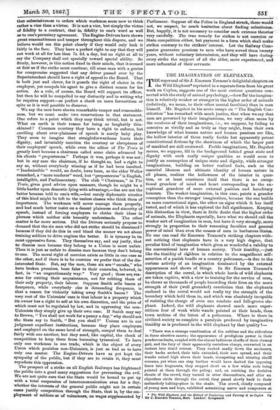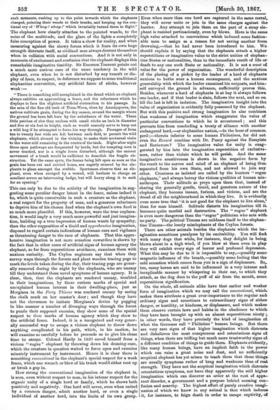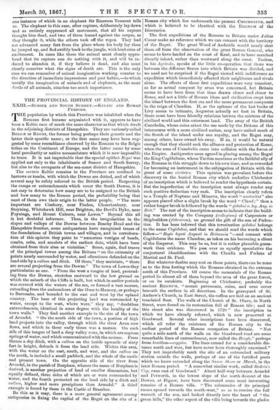THE IMAGINATION OF ELEPHANTS.
THE reperusal of Sir J. Emerson Tennent's delightful chapters on the Wild Elephant reprinted in a separate form from his great work on Ceylon, suggests one of the most curious questions con- nected with the study of animal psychology,—how rar the imagina- tion is relatively weaker or stronger in the higher order of animals (relatively, we mean, to their other mental faculties) than in man himself. Mr. Bagehot in his acute essays on "The English Con- stitution" has remarked with much justice, that when we say that men are governed by their imaginations, we very often mean by the weakness of their imaginations, i.e., we suppose, by failing to conceive as vividly and as truly as they might, from their own knowledge of what human nature and human passions are like, the hollow interior -of those really feeble but apparently potent constitutional fictions -by the showiness of which the larger part of mankind are still overawed. Feeble imaginations, Mr. Bagehot means, we suppose, fill in the background behind great state and dignity with such really unique qualities as would seem to justify an assumption of unique state and dignity, while stronger imaginations, building on better realized facts, such as the essential likeness and ultimate identity of human nature in all phases, realizes the hollowness of the interior in ques- tion, or at least convinces itself that there is no excep- tional grandeur of mind and heart corresponding to the ex- ceptional grandeur of mere external position and hereditary honours. The weaker imagination, in this case, paints a grander conception than the stronger imagination, because the one builds on mere conventional signs, the other on signs which it has itself tested, and of which it has explored the full significance. Keeping this distinction in view, there is little doubt that the higher order of animals, the Elephants especially, have what we should call the weaker sort of imagination in men, but have it very strongly, more strongly in proportion to their reasoning faculties and general power of mind than even the masses of men in barbarous States. No one can read Sir Emerson Tennent's striking chapters with- out noticing that elephants have in a very high degree, that peculiar kind of imagination which gives so wonderful a validity to the conventional laws of human society. Their tirnidity,—just like the timidity of children in relation to the magnificent self- assertion of a parish beadle or a country policeman,—is due to the curious activity of an imagination dominated by the external appearances and shows of things. In Sir Emerson Tennent's description of the corral, in which whole herds of wild elephants are taken captive, with a view to training for the service of man, he shows us thousands of people hazarding their lives on the mere strength of their (well grounded) conviction that the elephants enclosed in the corral would not really try the strength of the boundary which held them in, and which was absolutely incapable of resisting the charge of even one resolute and full-grown ele- phant. Indeed, the wild elephants showed much more super- stitious fear of weak white wands pointed at their heads, than town urchins of the baton of a policeman. Where is there in civilized society so complete a paralysis produced by imaginative timidity as is produced in the wild elephant by that quality 4— " There was a strange combination of the sublime and the ridiculous in these abortive onsets ; the appearance of prodigious power in their ponderous limbs, coupled with the almost ludicrous shuffle of their clumsy gait, and the fury of their apparently resistless charge, converted in an instant into timid retreat. They rushed madly down the enclosure, their backs arched, their tails extended, their ears spread, and their trunks raised high above their heads, trumpeting and uttering shrill screams, yet when one step further would have dashed the opposing fence into fragments, they stopped short on a few white rods being pointed at them through the paling ; and, on catching the derisive shouts of the crowd, they turned in utter discomfiture, and after an objectless circle through the corral, they paced slowly back to their melancholy halting-place in the shade. The crowd, chiefly composed of young men and boys, exhibited astonishing nerve and composure at • The Wild Ekpliant, and the Method of Capturing and Taming is in won By Sir J. Emerson Tennant, Dart. London: Longman,.
such momenta, rushing up to the point towards which the elephants charged, pointing their wands at their trunks, and keeping up the con-
tinual cry of 'Whoop! whoop!' which invariably turned them to flight."
The elephant here clearly attaches to the pointed wands, to the noise of the multitude, and the glare of the lights a completely false conception of power. It takes a show for reality, and when measuring against the showy forces which it fears its own huge strength distrusts itself, as civilized men always distrust themselves when in collision with social conventions. And it is not only in moments of excitement and confusion that the elephant displays this remarkable imaginative timidity. Sir Emerson Tennent points out a much more curious case of the same tendency in the wild elephant, even when he is not disturbed by any tumult or dis- play of force, to respect, in deference we suppose to some traditional elephantine convention, any artificial fence of sticks, however weak :— 4.
" There is something still unexplained in the dread which an elephant always exhibits on approaching a fence, and the reluctance which he displays to face the slightest artificial obstruction to his passage. In the area of the fine old tank of Tissa-Weva, close by Anarajapoora, the natives cultivate grain, during the dry season, around the margin where the ground has been left bare by the subsidence of the water. These little patches of rice they enclose with small sticks an inch in diameter and five or six feet in height, such as would scarcely servo to keep out a wild hog if he attempted to force his way through. Passages of from ten to twenty feet wide are left between each field, to permit the wild elephants, which abound in the vicinity, to make their nocturnal visits to the water still remaining in the centre of the tank. Night after night these open pathways are frequented by herds, but the tempting corn is never touched, nor is a single fence disturbed, although the merest movement of a trunk would be sufficient to demolish the fragile ob- struction. Yet the same spots, the fences being left open as soon as the grain has boon cut and carried home, are eagerly entered by the ele- phants to glean amongst the stubble. Sportsmen observe that an ele- phant, even when enraged by a wound, will hesitate to charge an assailant across an intervening hedge, but will hurry along it to seek for an opening."
This can only be due to the activity of the imagination in sug- gesting some peculiar danger latent in the fence, unless indeed it be, which is quite conceivable in such a creature as the elephant, a real respect for the property of man, and a generous reluctance to deprive him of his chosen food when the elephant's own food is so much more plentiful. If this, however, were the true explana- tion, it would imply a very much more powerful and just imagina- tion, building up a true impression of human wants by sympathy, than the other supposition of a timid and apprehensive imagination, disposed to regard certain indications of human care and vigilance as threatening danger to the race of elephants. That this appre- hensive imagination is not mere senseless cowardice is shown by the fact that in other cases of artificial signs of human agency the elephant, so far from superstitious avoidance, examines them with anxious curiosity. The Ceylon engineers say that when they survey ways through the forests and plant wooden tracing pegs to mark the levels taken during the day, their tracing pegs are gener- ally removed during the night by the elephants, who are uneasy till they understand these novel symptoms of human agency. It is clear, then, that the elephants are rendered uneasy, troubled in their imaginations, by these curious marks of special and unexplained human interest in their dwelling-place, just as Morgiana in the Forty Thieves was rendered uneasy by seeing the chalk mark on her master's door ; and though they have not the cleverness to imitate Morgiana's device by pegging in like manner a number of diverging ways through the forest to puzzle their supposed enemies, they show none of the special respect to these marks of human agency which they show to the artificial fence. Indeed, it is a recognized and very gener- ally successful way to escape a vicious elephant to throw down anything complicated in his path, which, in his caution, he will examine so carefully before he proceeds as to give his chase time to escape. Colonel Hardy in 1820 saved himself from a vicious " rogue " elephant by throwing down his dressing-case, which the creature in question waited to force open and examine minutely instrument by instrument. Hence it is clear there is something conventional in the elephant's special respect for a weak fence, which one wrench or blow of his trunk would either root up or break a gap in.
How strong the conventional imagination of the elephant is, is seen, even without respect to man, in his intense respect for the organic unity of a single herd or family, which he shows both positively and negatively. One herd will never, even when united by a common danger, admit another herd, or even a single individual of another herd, into the limits of its own group.
Even when more than one herd are captured in the same corral, they will never unite or join in the same charges against the barrier. Any attempt to join them on the part of a stray ele- phant is resisted pertinaciously, even by blows. Here is the same high value attached to conventions which induced some fashion- able man to assign as a reason for not saving another from drowning,—that he had never been introduced to him. We should explain it by saying that the elephants attach a higher superstitious or imaginative value to the strict unities of elephan- tine States or nationalities, than to the immediate result of life or death to any one such State or nationality. It is not a want of value for the power of organization. The wonderful description of the placing of a picket by the leader of a herd of elephants anxious to bathe near a human encampment, and the anxious.
generalship with which the leader examined his outposts, and him.- self surveyed the ground in advance, sufficiently proves this.
Besides, whenever a herd of elephants is at bay it always follows.
one leader, and if that leader is slain, follows the next, and so on. till the last is left in isolation. The imaginative insight into the.
value of organization is evidently fully possessed by the elephant.
But with this positive and strong imagination he also combines. that weakness of imagination which exaggerates the value of particular conventions to which he is accustomed ; and this.
prevents him from concluding a treaty of alliance with another endangered herd,—or elephantine nation,—in the hour of common.
peril ;—therein inferior to some human Philistines, for did not
even the Record combine with Dr. Pusey against the Essayists. and Reviewers ? The imaginative value for unity is exag-
gerated by him into the imaginative superstition. of exclusive- ness, rather than violate which he will perish. And the same imaginative sensitiveness is shown in the negative format by the result to the nerves and mind of an elephant of being thus. separated from his own State, and not allowed to join any other. Creatures so isolated are called by the hunters " rogue elephants," and always betray the vicious qualities of human mis- anthropes. Their solitude so preys upon them that, instead of
sharing the generally gentle, timid, and generous nature of the, elephant, they become insane, furious, and vicious, and are the
dread of all the neighbourhood in which they live. It is evidently even more true that it is not good for the elephant to live alone,' than for man himself. Solitude distorts his imagination till it..
becomes quite morbid and destructive. The " rogue " elephant is even more dangerous than the "rogue" politician who acts with. no party. The political Timons are mildness itself to the elephan- tine Timons—the lonely miselephants of the Ceylon forests.
There are other animals besides the elephants which the im- agination sometimes paralyzes by its excitability. You will find, with many dogs that while, for instance, they delight in being.
blown about in a high wind, if you blow at them even in plays they will exhibit every sign of horror and profound depression.
What this may be due to it is impossible to say,—possibly some- magnetic influence of the breath,—possibly some feeling that the- cold sensation which comes from you is a sign of displeasure. So,.
too, many horses are said to be influenced in a very intense and. inexplicable manner by whispering in their ear, to which they attach, as the dog does to the puff of air from the mouth, some, superstitious signification.
On the whole, all animals alike have that earlier and weaker form of imagination which we may call the conventional, which.
makes them attribute a great over-importance to the regular and, ordinary signs and sometimes to extraordinary signs of eithen danger, or hostility, or kindness, or displeasure, and which makes- them observe certain laws and habits in the obedience to which. they have been brought up with an almost superstitious nicety
in other words, they have precisely the kind of imagination of what the Germans call "Philistine" human beings. But there.
are very rare signs of that higher imagination which distrusts.
and disbelieves the most conspicuous and ostentatious signs of things, when there are trifling but much more trustworthy signs of.
a different condition of things to guide them. Elephants evidently, like many human beings, have an implicit faith in the power which can raise a great noise and dust, and no sufficiently sceptical elephant has yet arisen to teach them that these things.
are usually symptoms rather of brag and weakness than of real strength. They have not the sceptical imagination which distrusts.
ostentatious symptoms, nor have they apparently the still higher imagination which can discover an order at the root of appa- rent disorder, a government and a purpose behind seeming con-
fusion and anarchy. The highest effort of purely creative imagi- nation of which we know in any animal is that which induces. it, for instance, to feign death in order to escape captivity, of
one instance of which in an elephant Sir Emerson Tennent tells us. The elephant in this case, after capture, deliberately lay down and so entirely suppressed all movement, that all his captors thought him dead, and two of them leaned against the corpse, as they thought it, while the others took off the ropes. They had not advanced many feet from the place where his body lay than he jumped up, and fled swiftly back to the jungle, with loud cries of excitement. In eases like these the animal must clearly appre- hend that its captors can do nothing with it, and will be in- duced to abandon it, if they believe it dead, and also must clearly conceive what the signs of death are. This is the only case we can remember of animal imagination working counter to the direction of immediate impressions and past habits,—to which usually the imagination of animals and of elephants, as the most flocile of all animals, attaches too much importance.




































 Previous page
Previous page